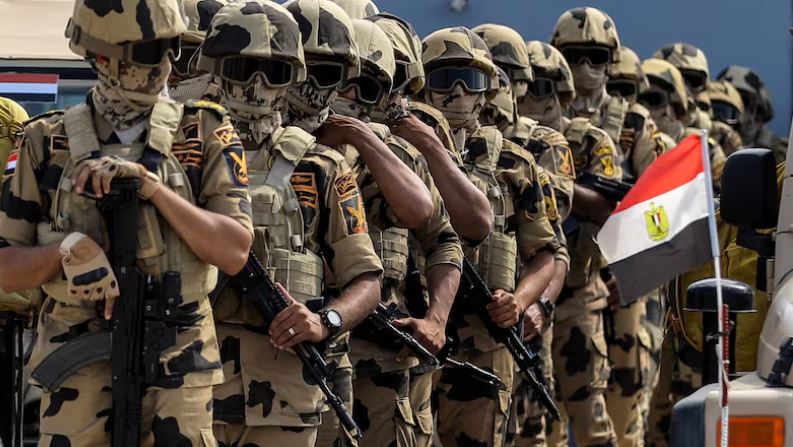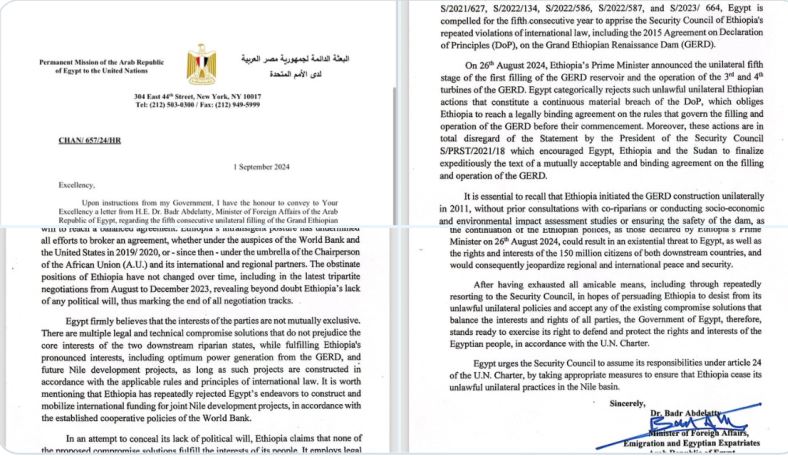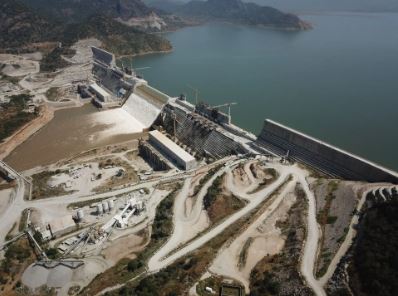Egyptian Foreign Minister Badr Abdel Atty on Sunday revealed that he had written to the UN Security Council to protest what it calls Ethiopia’s unilateral policies of continuing building and filling the colossal Grand Ethiopian Renaissance Dam, which Cairo sees as depriving it of its rightful share of water.
Cairo rejects Ethiopia’s policies of moving ahead with completing the construction of the dam and filling its reservoir without consulting downstream Egypt, the letter reads in part, saying that it threatens regional stability.
The letter does not add anything new to the long-standing Egyptian position on Ethiopia’s handling of the dispute with Cairo over the Grand Ethiopian Renaissance Dam (Gerd). However, it takes on added significance because it comes amid rising tensions between the two nations.
Egypt has vowed to act in defense of its people’s interests after Ethiopia announced the completion of the fifth stage of filling the Grand Ethiopian Renaissance Dam (GERD).
“After having exhausted all amicable means, including through repeatedly resorting to the Security Council, in hopes of persuading Ethiopia to desist from its unlawful unilateral policies and accept any of the existing compromise solutions that balance the interests and rights of all parties, the Government of Egypt, therefore, stands ready to exercise its right to defend and protect the rights and interests of the Egyptian people, per the U.N. Charter,” said Egypt’s Foreign Minister, Dr Badr Abdelatty in a letter to the United Nations Security Council dated September 1, 2024.
Egypt, which recently deployed commandos and heavy military equipment in Somalia which shares a long border with Ethiopia, did not specify its possible action, but its leaders have previously warned of a military response.
On August 26, 2024, Ethiopia’s Prime Minister announced the fifth stage of the first filling of the GERD reservoir and the operation of the third and fourth turbines of the GERD.
“Egypt categorically rejects such unlawful unilateral Ethiopian actions that constitute a continuous material breach of the DoP, which obliges Ethiopia to reach a legally binding agreement on the rules that govern the filling and operation of the GERD before their commencement,” Badr emphasized.
Egypt, which has a population of about 120 million people and relies on the River Nile for nearly all of its freshwater households and agriculture – especially for growing cotton, has for the past decade been at loggerheads with Ethiopia over the use of the Nile waters to fill the $4.2bn dam.
Ethiopia says it desperately needs the dam to produce electricity for the 60 percent of its population who currently have no supply and also power enterprises to spur business growth.
At full capacity, the huge hydroelectric dam – 1.8 kilometers (1.1 miles) long and 145 meters (476 feet) high – could generate more than 5,000 megawatts.
That would double Ethiopia’s production of electricity, to which only half the country’s population of 120 million currently has access.
External adversary
However, Badr said, “Ethiopia’s rigid GERD positions are designed to mobilize the Ethiopian people against a fictitious external adversary, and divert the international public attention from its unlawful policy in the region, particularly its unilateral exploitation of shared water resources, which has repeatedly harmed Ethiopia’s neighbors in the basins of the Omo River, the Jubba River, and the Shabelle River.”
Egypt has previously threatened to use military force to blow up the dam
Tensions hit boiling levels last with Egypt deploying over 1,000 commandos and heavy military equipment in Mogadishu as part of a bilateral defense agreement signed between Egyptian President Abdel Fattah El-Sisi and his Somali counterpart, Hassan Sheikh Mohamud in Cairo earlier this year.

President Mohamud secured Egypt’s military support after Ethiopia signed an agreement with the secessionist Somaliland region in Somalia to have access to the Red Sea.
The deal signed by Ethiopian Prime Minister Abiy Ahmed and Somaliland’s leader, Muse Bihi Abdi in December 2023 would see Somaliland “lease 20 km of the Red Sea to Ethiopia” for the next 50 years to establish a military base there.
In response to Egypt’s deployment of military forces in Mogadishu last week, Ethiopia warned it could not stand idle while other actors are taking measures to destabilize the region,” adding that Addis Ababa was “vigilantly monitoring developments in the region that could threaten its national security.”
The unfolding security tensions in the Horn of Africa could spark a war in a region struggling to recover from decades of conflict.
C-130 military planes on Wednesday, August 28, delivered senior Egyptian army officers and heavy equipment at Adden Ade International Airport in Mogadishu (Courtesy photo)
Egypt’s fury
Badr told the UN Security Council that for more than 13 years, Egypt has made every possible diplomatic effort to reach an amicable solution on the GERD, yet to no avail.
“The prolonged and futile rounds of negotiation demonstrated clearly that Ethiopia lacks the requisite political will to reach a balanced agreement. Ethiopia’s intransigent posture has undermined all efforts to broker an agreement, whether under the auspices of the World Bank and the United States in 2019/ 2020 or – since then – under the umbrella of the Chairperson of the African Union (A.U.) and its international and regional partners. The obstinate positions of Ethiopia have not changed over time, including in the latest tripartite negotiations from August to December 2023, revealing beyond doubt Ethiopia’s lack of any political will, thus marking the end of all negotiation tracks,” said Badr.
Egypt said multiple legal and technical compromise solutions do not prejudice the core interests of the two downstream riparian states, while fulfilling Ethiopia’s pronounced interests, including optimum power generation from the GERD, and future Nile development projects, as long as such projects are constructed by the applicable rules and principles of international law.
Egypt’s letter to the UN Security Council
Cairo further accused Ethiopia of repeatedly rejecting Egypt’s endeavors to construct and mobilize international funding for joint Nile development projects, under the established cooperative policies of the World Bank.

Cairo said in an attempt to conceal its lack of political will, Ethiopia claims that none of the proposed compromise solutions fulfill the interests of its people, adding that Addis Ababa “employs legal arguments that are unfounded either in law or in international practice, then rejects to test the validity of its legal positions through resorting to any arbitral or binding dispute resolution mechanism.”
Museveni’s views
Egypt, however, lacks the support of regional countries in what observers say is a quest to control the management of the Nile waters.
In 2013, President Museveni described threats by then Egyptian president Mohamed Morsi to wage war against Ethiopia as ‘chauvinistic’, emphasizing that, “No African wants to hurt Egypt; however, Egypt cannot continue to hurt black Africa and the countries of the tropics of Africa.”
Museveni further said leaders of Egypt should not be victims of the “misguided policies of past leaders” and stressed that the “threat of the Nile is not the construction of dams but the “lack of electricity and underdevelopment in the tropics.”
He emphasized: “On account of these two, peasants cut the biomass for fuel (firewood) and invaded the forests to expand primitive agriculture. Here in Uganda, the peasants destroy 40 billion cubic meters of wood per annum for firewood. They also invade the wetlands to grow rice.”
Museveni said the Egyptians wanted to drain the wetlands in South Sudan through the Jonglei canal.
“It was one of the causes for the people of South Sudan to wage war against Khartoum, which was collaborating with the Egyptian Government’s misguided and dangerous policies of that time,” he added.
Khaled Mahmoued, an Egyptian journalist, said, “All options are on the table for Egypt in dealing with Ethiopia,” adding, “The transition from diplomatic to military tools could mean that Egypt might be forced to resort to military action due to Ethiopia’s intransigence.”
Khaled emphasized: “Egypt’s message to the UN Security Council reflects a shift from a strategy of containing Ethiopia to a phase of applying pressure before moving to deterrence.”




